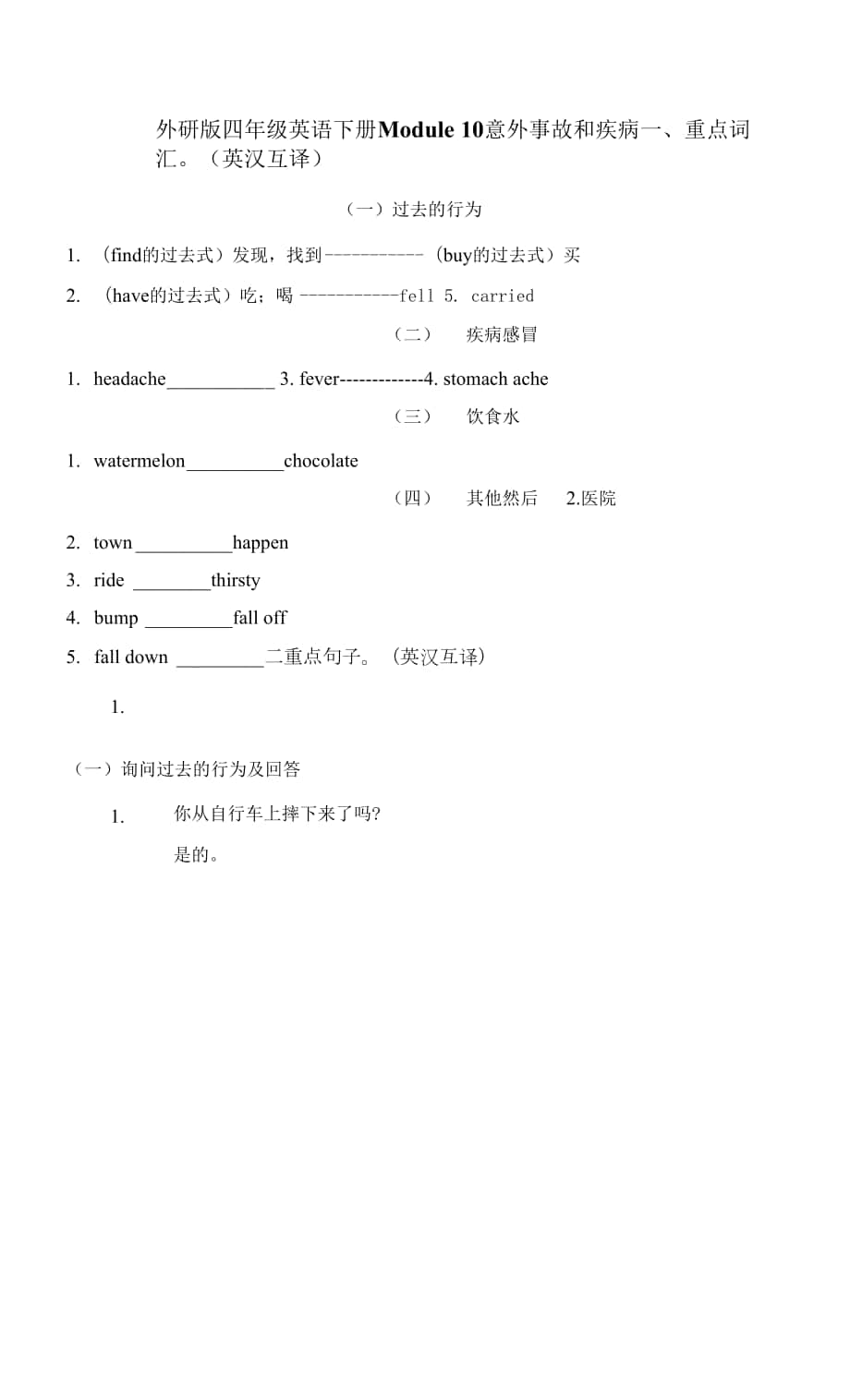《外研版四年級(jí)英語(yǔ)下冊(cè)Module 10 意外事故和疾病 附答案.docx》由會(huì)員分享���,可在線閱讀��,更多相關(guān)《外研版四年級(jí)英語(yǔ)下冊(cè)Module 10 意外事故和疾病 附答案.docx(8頁(yè)珍藏版)》請(qǐng)?jiān)谘b配圖網(wǎng)上搜索����。
1���、外研版四年級(jí)英語(yǔ)下冊(cè)Module 10意外事故和疾病一�����、重點(diǎn)詞匯�。(英漢互譯)
(一)過(guò)去的行為
1. (find的過(guò)去式)發(fā)現(xiàn)�,找到 (buy的過(guò)去式)買
2. (have的過(guò)去式)吃;喝 fell 5. carried
(二) 疾病感冒
1. headache 3. fever 4. stomach ache
(三) 飲食水
1. watermelon chocolate
(四) 其他然后 2.醫(yī)院
2. town happen
3. ride thirsty
4. bump fall off
5. fall down 二重點(diǎn)句子���。(英漢互
2�、譯)
(一)詢問(wèn)過(guò)去的行為及回答1.
1.
你從自行車上摔下來(lái)了嗎?
是的���。
2.
?你們買了一些水嗎���? 不,我們買了一個(gè)西瓜���。
(二) 描述過(guò)去的行為Sam and I went for a bike ride yesterday.
1. And we were hungry and ihirsly.
(三)描述過(guò)去的行為和疾病薩姆昨天吃了許多巧克力���,所以今天他肚子痛。
1. Lingling had a headache yesterday, and today she's got a fever.
三���、重點(diǎn)語(yǔ)法�。
(一) 選擇恰當(dāng)?shù)膯卧~或詞組補(bǔ)全句子。
3��、
A. have B. has C. hadD. has got E. had got
()1. She often(經(jīng)常)some bread and milk for dinner.
( )2.1 want to some water.
( )3. Tom lots of watermelons yesterday.
( )4. Last Sunday Ann a stomach ache, so her mother took her to the hospital.
( )5. Today Sam a headache.
(二) 判斷下列句子是(T)否(F)與圖片內(nèi)容相符
4�����、��。
( )1. The boy has got a headache.
( )2. He has got a fever.
( )3. She is having an apple.
( )4. Tom has got a stomach ache.
()5. Cats like to have fish.
四情景交際�����。
(一) 情景選擇��。
()1.當(dāng)你想問(wèn)對(duì)方的手怎么了���,可以這樣說(shuō):
A. What happened to your hand?
B. What happen to my hand?
()2.當(dāng)病人想跟醫(yī)生說(shuō)他感冒了����,感覺(jué)很冷時(shí)�,可以這樣
5、說(shuō):_
A. He has a cold and he feels cold.
B. I had a cold and I felt cold.
()3.當(dāng)你想告訴對(duì)方你們昨天一整天都在玩游戲時(shí)�,可以這樣說(shuō):
A. We played games all day yesterday.
B. We play games all day yesterday.
()4.當(dāng)媽媽問(wèn)你吃了什么時(shí),可以這樣回答:
A. I had a picnic.
B. I had apples and cakes.
()5.當(dāng)你想告訴爸爸,你在床底下找到了你的書包時(shí)����,可以這樣說(shuō):
A. I fin
6���、d my school bag under my bed.
B. 1 found my schoolbag under my bed.
(二) 根據(jù)情景將下列句子排成-段通順的對(duì)話����。(其中兩句已排序)()Did he fall off the chair?
( )What happened to your arm, Jerry?
()Did you help him?
(2 )Yesterday Bob played on a chair.
(7 )You are great, Jerry.
( )Yes, 1 did. But I bumped my arm.
()Yes,
7���、he did.
Module 10意外事故和疾病
一�、 (一)1. found 2. bought 3. had(fall的過(guò)去式)掉下��,落下���;摔倒
2. (carry的過(guò)去式)拿�����,搬
(二) 1. cold 2.頭痛3.發(fā)燒4.胃痛
(三) 1. water 2.西瓜3.巧克力
(四) 1. then 2. hospital 3.城鎮(zhèn)��,市鎮(zhèn)4.發(fā)生5.騎車6.( 口)渴的7.撞傷
8.跌落9.摔倒�,跌倒;坍塌二���、 (一)1. 一Did you fall off your bike ?
一Yes, I did.
1. 一Did you buy some water ?
—N
8���、o, we bought a watermelon.
(二) 1.薩姆和我昨天去騎車了。
2.而且我們又餓又渴����。
(三) I. Sam had lots of chocolate yesterday, so today he's got a stomach ache.
2.玲玲昨天頭痛,今天她發(fā)燒了���。
三����、 (一)1.B2.A3.C4.E5.D
(二)1.F2.T3.T4.F5.T四����、 (一)1.A2.B3.A4.B5.B
(二)3 1 5 (2)⑺ 6 4
1. 形容詞的用法
外研版四年級(jí)英語(yǔ)下冊(cè)易錯(cuò)點(diǎn)
形容詞通常用來(lái)修飾名詞,表示人或事物的性質(zhì)�����、狀態(tài)和特征�。它的位置通常
9����、
放在被修飾的名詞前���,也可以放在be動(dòng)詞�����、 詞之后。練一練單項(xiàng)選擇����。
look、feel��、taste�����、
soundget 等
()1. Ms Smart is .
A. a teacher nice
()2. My book is .
A. new
()3. You happy.
A. take
2. be動(dòng)詞過(guò)去式的用法
B. a nice teacher
B. a new
B. like
C. a nice
C. news
C. look
be動(dòng)詞的過(guò)去式表示人或物在過(guò)去的情況或存在的狀態(tài)�。am, is的過(guò)去式為was; are 的過(guò)去式為 were����。
10��、
句式
結(jié)構(gòu)
回答
肯定句
主語(yǔ)+was / were+其他.
否定句
主語(yǔ)+was / were+not+ 其他.
一般疑問(wèn)句
Was/Were+主語(yǔ)+其他��?
Yes, 主語(yǔ)+ was / were.
No,主語(yǔ)+wasn't / weren't.
特殊疑問(wèn)句
特殊疑問(wèn)詞+was / were +主語(yǔ)+其他���?
根據(jù)特殊疑問(wèn)詞回答
練一練選擇恰當(dāng)?shù)膯卧~填空。
1.1 (was / were) at home. But they (was / were) at the supermarket.
2. He (wasn't / weren't) tall
11�、then. He (were / was) short.
3. 一 (Was / Were) you on holiday in Shanghai?
—No, we (weren't / wasn't).
4. 一 Where (was / were) Lingling yesterday?
一She (were / was) in the park.
2. -?般將來(lái)時(shí):一般將來(lái)時(shí)表示將來(lái)某一時(shí)刻的動(dòng)作或狀態(tài),或?qū)?lái)某一段時(shí)間
內(nèi)經(jīng)常的動(dòng)作或狀態(tài)��。其句式結(jié)構(gòu)如下:
肯定句主語(yǔ)+will+其他.
否定句主語(yǔ)+w()n't+其他.
一般疑問(wèn)句Wilk主語(yǔ)+其他���?回答�����,
Yes
12����、,主語(yǔ)+will.
�、No,主語(yǔ) +wont.
廣般將來(lái)時(shí)態(tài)特殊疑問(wèn)句特瓣走可詞+will+主語(yǔ)+其他?根據(jù)特殊疑問(wèn)詞回答
練?練單項(xiàng)選擇。
( )1.1 my ball tomorrow.
A. will taking B. take( )2. Sam to the park next Sunday.
A. won't go B. will going( )3. 一Will you go to the cinema tomorrow?
—No, I.
A. will B. won't()4. What you do this Saturday?
A. are B. doC.
13��、 will take
C. won't going
C. am
C. will
C. will take
C. won't going
C. am
C. will
3. 一般過(guò)去時(shí):一般過(guò)去時(shí)表示在過(guò)去的某一時(shí)刻或某一時(shí)間段所發(fā)生的事情或 存在的狀態(tài)���。表示過(guò)去的時(shí)間狀語(yǔ)有yesterday, last night, three days ago等等�。 次一般過(guò)去時(shí)的肯定句:主語(yǔ)+動(dòng)詞過(guò)去式+其他.
淤一般過(guò)去時(shí)的否定句:主語(yǔ)+didnV動(dòng)詞原形(行為動(dòng)詞)+其他.
次一般過(guò)去時(shí)的一般疑問(wèn)句:Did+主語(yǔ)+動(dòng)詞原形(行為動(dòng)詞)+其他?
次一般過(guò)去時(shí)的特殊疑問(wèn)句:特殊疑問(wèn)
14���、詞+did +主語(yǔ)+動(dòng)詞原形(行為動(dòng)詞)+其他?
動(dòng)詞變?yōu)檫^(guò)去式的規(guī)則
變化規(guī)則
例詞
規(guī)則
變化
1. 一般在動(dòng)詞詞尾直接加ed
work-worked want-wanted
2.以e結(jié)尾的動(dòng)詞直接加d
dance-danced phone-phoned
3.輔音字母加y結(jié)尾的詞�����,變y為i再
加ed
study-studied carry-carried
4.以重讀閉音節(jié)結(jié)尾�,末尾只有一個(gè)輔 音字母的單詞�����,雙寫這個(gè)輔音字母再 加ed
drop-dropped skip-skipped
不規(guī)則
變化
eat-ate drink-drank
練一練用
15����、所給動(dòng)詞的適當(dāng)形式填空�����。
1. Yesterday I (walk) to school.
2. My grandma didn't (cook) noodles. She (cook) fish.
3. (do) you (have) a nice holiday last week?
4. What (do) they (do) for the party yesterday?
易錯(cuò)點(diǎn)一���、 1.B2.A3. C
二����、 1. was; were 2. wasn't��; was
2. Were��; weren't 4. was���; was三���、 I.C2. A3. B4.C
四、 1. walked 2. cook�����; cooked 3. Did�����; have
3. did��; do
 外研版四年級(jí)英語(yǔ)下冊(cè)Module 10 意外事故和疾病 附答案.docx
外研版四年級(jí)英語(yǔ)下冊(cè)Module 10 意外事故和疾病 附答案.docx

